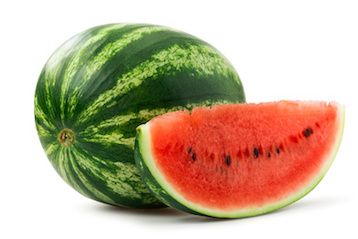
Sponsored By
Health Benefits:
Aids in digestion
Aids in intestinal disorders
Anti inflammatory
Aphrodisiac
Diuretic
Fights free radicals
Improves hair skin and nails
Increases Sex Hormones & Orgasm
May reduce cholesterol
May reduce nausea
May reduce risk of cancer
Relieves constipation
Nutrition:
Serving size: 1 cup; Calories: 46; Fat: 0.4g; Cholesterol: 0mg; Sodium: 2mg; Carbs: 11g;Fiber: 1g; Sugars: 9g; Protein: 1g; Potassium: 5% DV; Vitamin A: 17%DV; Vitamin C: 21%DV; Calcium: 1%DV; Iron: 2%DV
Did You Know?
- Studies have shown that eating watermelon can decrease the risks of developing asthma, high blood pressure and cancer
- Watermelon, because of its water and fiber content, helps to prevent constipation and promote regularity
- Watermelon is also great for your skin because it contains vitamin A. Vitamin A is also necessary for the growth of bodily tissues, including skin and hair
Ways to Eat:
- Raw
- Juiced
- Grilled
Farming Trivia:
- The first recorded watermelon harvest occurred nearly 5,000 years ago in Egypt and is depicted in Egyptian hieroglyphics on walls of their ancient buildings
- Southern food historian, John Egerton, believes watermelon made its way to the United States with African slaves as he states in his book, "Southern Food."
- About 200-300 varieties are grown in the U.S. and Mexico, although there are about 50 varieties that are very popular
Note: Always consult a physician for any specific health questions and concerns. Some of this information may be subject to change should there be any new findings from Federal Health Administration (FHA), Food & Drug Administration (FDA), American Medical Association (AMA), American Cancer Society (ACS), and / or other leading food, nutrition and medical advisors.


